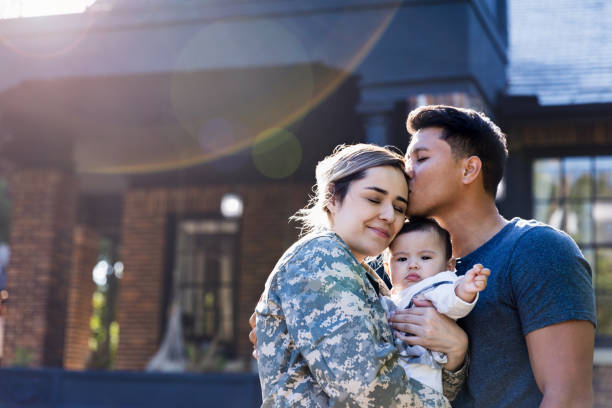It can be difficult to navigate the world of VA Benefits for Spouses, particularly for spouses of veterans who are not familiar with the procedure. Nonetheless, wives and their families may benefit greatly from knowing about and using these benefits. This post will examine the several VA Benefits for Spouses, as well as the requirements for qualifying, the application procedure, and tools to make the process go more smoothly.
Understanding Eligibility Criteria
Spouses of veterans may be eligible for VA Benefits for Spouses under certain conditions. A veteran’s eligibility is frequently determined by their duration of service, service-connected disability status, and whether or not they have passed away. For example, Dependency and Indemnity Compensation (DIC) benefits may be available to wives of veterans who died in the line of duty or as a result of a disability related to their military service.
Financial Assistance Programs
Financial support programs like the Survivors Pension, which pays a monthly allowance to qualified surviving spouses of deceased wartime veterans with low income, are among the VA Benefits for Spouses. The Death Gratuity, a one-time payment made to the surviving spouse of a military member who passes away while on active duty, may also be available to spouses.
Healthcare Benefits
Certain veterans’ spouses may be qualified for VA healthcare benefits. This can entail having access to VA clinics and hospitals, as well as having insurance for prescription drugs, medical services, and mental health assistance. The veteran’s disability rating and any ailments related to their service are just two examples of the variables that affect their eligibility for healthcare benefits.
Educational and Training Opportunities
The Survivors’ and Dependents’ Educational Assistance (DEA) program is one of the programs that the VA offers to spouses as benefits for education and training. Financial aid is available to qualified spouses who want to pursue apprenticeships, vocational training, or study. Spouses looking to advance their education or pick up new skills to improve their job prospects will find this advantage to be quite helpful.
Housing Assistance Programs
Veterans’ spouses may also be eligible for VA housing aid programs. Benefits like the VA Home Loan Guaranty Program, which gives qualified spouses access to reasonably priced home financing choices, may fall under this category. Surviving spouses may also qualify for advantageous terms and conditions on VA-backed home loans.
Counseling and Support Services
Spouses of veterans can get counseling and support services from the VA Benefits for Spouses, such as caregiver support programs, marriage therapy, and counseling for grief. These programs are designed to meet the special needs and challenges of spouses who may be managing caregiving obligations, grieving the loss of a loved one, or adjusting to the effects of military service on family relations.
Application Process and Resources
Spouses often find it difficult to navigate the VA benefit application process, but there are resources available to help them at every stage. Through veteran service organizations, online resources, and VA regional offices, spouses can obtain information and guidance. Additionally, to guarantee that spouses obtain the benefits to which they are entitled, seeking guidance from qualified specialists or accredited representatives can help expedite the application process.
Financial Assistance Programs: A Lifeline for Spouses of Veterans
Although having financial stability is essential for overall wellbeing, many spouses of veterans encounter particular difficulties in attaining it. Thankfully, there are financial aid programs created especially to help veteran spouses in a variety of situations. This post will discuss the many financial aid options available, the requirements for applying, and how they can help widows of veterans by giving them much-needed support.
Survivors Pension
The VA provides eligible surviving spouses of deceased wartime veterans with little income with a key financial aid program known as the Death Pension, or Survivors Pension. A tax-free monthly payment is provided by this pension to assist with the necessities of life. Spouses must fulfill certain income and asset requirements in addition to other qualifying requirements including the veteran’s service length and cause of death.
Dependency and Indemnity Compensation (DIC)
Spouses of veterans who passed away while on active duty or as a result of a disability related to their service are eligible for DIC compensation. In addition to monthly financial support, qualifying surviving spouses can get additional benefits such healthcare coverage via the Department of Veterans Affairs’ Civilian Health and Medical Program (CHAMPVA). DIC benefits provide spouses who have lost a loved one to a military service-related cause with vital financial stability.
Death Gratuity
A one-time payment known as the Death Gratuity is given to the surviving spouse of a military member who passes away while doing active duty. Following the death of a spouse, this tax-exempt contribution provides urgent financial support to aid with burial costs and other pressing needs. Although it cannot take the place of other programs’ long-term financial help, the Death Gratuity provides much-needed relief during a trying time.
Educational Benefits
Veterinarian spouses may also be eligible for educational assistance programs like the DEA (Survivors’ and Dependents’ Educational Assistance). Spouses who want to pursue apprenticeships, vocational training, or study can apply for financial support through this program. Spouses who meet the eligibility requirements can get stipends each month to assist with paying for books, tuition, and other educational costs. This allows them to further their education and explore employment options.
Home Loans and Housing Assistance
Veterans’ spouses who meet the eligibility requirements can obtain inexpensive home financing choices with advantageous terms and conditions through the VA Home Loan Guaranty Program. Additionally, spouses may be eligible for VA-backed home loans, which have low interest rates and no down payment requirements. Furthermore, programs designed to prevent homelessness and provide stable housing solutions may make surviving spouses eligible.
Financial Counseling and Support Services
Wives of veterans can gain from financial counseling and support services provided by the VA and other veteran service groups in addition to direct financial help. These services offer advice on financial issues such as retirement planning, debt management, and budgeting. These programs give couples the tools and resources they need to become more financially literate, enabling them to make wise decisions and attain better stability.
Navigating Healthcare Benefits: A Guide for VA Benefits for Spouses
Maintaining health requires having access to high-quality healthcare, but spouses of veterans may have particular difficulties when figuring out their entitlements. Thankfully, a number of healthcare benefits are available from the Department of warriors Affairs (VA) that are intended to assist spouses of warriors.
Access to VA Healthcare
Veterans’ spouses may qualify for healthcare benefits from the VA, giving them access to a network of clinics, hospitals, and medical specialists. VA healthcare benefits are subject to several eligibility conditions. However, spouses may be eligible if their veteran spouse is currently receiving VA healthcare, has passed away from a service-connected disability, or is completely and permanently disabled as a result of a condition related to their military service. Spouses can apply in person at their local VA medical center or online through the VA’s portal for healthcare benefits.
Coverage for Medical Services
Spouses of veterans who enroll in VA healthcare can receive a wide range of medical services to meet their healthcare needs. This covers prescription drugs, mental health treatments, preventive services, and primary care as well as specialist care. In the event that VA treatments are not available or cannot be accessed, spouses may be eligible for community care through the VA’s Community Care Network or can receive treatment at VA medical facilities.
Mental Health Support
The VA offers comprehensive mental health treatments to spouses of veterans because it understands how important mental health is. These services include therapy, counseling, support groups, and mental health counseling for disorders like anxiety, depression, and post-traumatic stress disorder (PTSD). Spouses can receive the assistance they require to maintain their mental health by accessing mental health care through community care providers, Vet Centers, or VA medical centers.
Coverage for Dependents
The VA provides healthcare benefits for dependent children of veterans in addition to benefits for spouses. Comprehensive healthcare services, such as medical, dental, vision, and mental health care, are available to eligible dependents. Veterans’ biological, adopted, and stepchildren are all protected by this policy, giving their families peace of mind that their children’s medical requirements will be met.
Caregiver Support
Through the VA, spouses who look for disabled veterans can now get caregiver assistance services. These services include financial aid programs, counseling, respite care, and caregiver education. The VA is dedicated to provide services and support to ensure caregivers can perform their caring responsibilities while maintaining their own health and well-being. Caregivers play a crucial role in helping veterans with complex medical requirements.
Empowering Spouses: Education and Training Opportunities through VA Benefits
Though wives of veterans may encounter particular obstacles in their pursuit of education and job aspirations, education is a potent instrument for both personal and professional advancement. Fortunately, the Department of Veterans Affairs (VA) offers a range of education and training benefits specifically designed to support spouses of veterans.
Survivors’ and Dependents’ Educational Assistance (DEA) Program
Survivors’ and Dependents’ Educational Assistance (DEA) is one of the main education benefits that spouses of veterans can get. Spouses who want to pursue apprenticeships, vocational training, or school can apply for financial aid through this program. Up to 45 months of educational benefits are available to qualified spouses, to be utilized for certificate programs, degree programs, and on-the-job training.
Eligibility Criteria
Spouses of veterans who are totally and permanently disabled from a service-connected illness, or who passed away from a service-connected illness while on active duty, must fulfill certain requirements in order to be eligible for DEA benefits. In addition, spouses may qualify if their veteran spouse is absent in combat, captured by an enemy force while performing their service, or imprisoned or interned against their will by a foreign government or authority.
Educational Benefits
Numerous educational costs are covered by DEA benefits, including as books, materials, tuition, fees, and even housing allowances for qualified spouses enrolled in full-time programs. Spouses can attend technical schools, colleges, universities, and other authorized institutions to further their education. DEA benefits can also be applied to online courses and remote learning programs, giving spouses who are juggling work and family obligations more freedom.
Career Advancement
Spouses can benefit from VA education benefits that not only provide access to educational options but also help with skill development and job growth. Spouses can improve their qualifications, raise their earning potential, and expand their work prospects by pursuing education and training in high-demand sectors. Wives aiming for career success might benefit greatly from DEA advantages, whether they want to start a small business, grow in their existing career, or explore a different area.
Transition Assistance
The VA understands how important it is to assist spouses going through transitions, like moving due to a military relocation or leaving the military to return to civilian life. Spouses can explore employment alternatives in their new location, adjust to new situations, and lay a strong foundation for their future with the support of education and training perks. To further aid spouses in their professional endeavors, the VA provides tools including networking opportunities, job placement assistance, and career counseling.
Homefront Support: Exploring Housing Assistance Programs for Spouses of Veterans
Obtaining secure and reasonably priced housing is an essential necessity for families, which includes wives of veterans. The Department of Veterans Affairs (VA) provides a variety of housing aid programs designed to benefit spouses of veterans, acknowledging the special difficulties experienced by military families.
VA Home Loan Guaranty Program
The VA Home Loan Guaranty Program is one of the main housing assistance programs accessible to spouses of veterans. Through VA-backed loans, this program gives qualified spouses access to reasonably priced home finance options. VA loans have a number of benefits, such as the opportunity to fund closing expenses, low interest rates, and no down payment requirements. Furthermore, VA loans exempt qualified spouses from paying private mortgage insurance (PMI), which lowers their monthly payments.
Eligibility Criteria
Spouses must fulfill specific eligibility conditions, such as being the spouse of a veteran who satisfies VA service requirements, in order to be eligible for VA home loan benefits. Veterans generally required to have completed a minimum of 90 consecutive days of active duty during a war, or 181 days during a peacetime. VA home loan benefits may also be available to spouses of veterans who passed away while serving in the armed forces or as a consequence of a disability related to their military service.
VA-backed Home Loans
Loans sponsored by the VA are available for primary house development, improvement, or purchase. VA loans can be used by spouses to build new houses, buy existing homes, or modify existing homes to be more energy-efficient. Furthermore, current mortgages can be refinanced using VA loans to get better terms or cheaper interest rates. Many eligible spouses can receive VA loans since they are handled by private lenders and provide various repayment alternatives.
Housing Assistance Programs
Spouses of veterans may be eligible for additional housing aid programs run by the VA in addition to VA home loans. These initiatives seek to assist low-income families, avoid homelessness, and guarantee stable housing. Rental help for low-income families, transitional housing for homeless veterans and their families, and supportive services for veterans with disabilities are a few examples of housing assistance programs.
Supportive Services
The VA provides supporting services to assist spouses in maintaining stable housing conditions because it understands that housing stability is crucial for overall well-being. These services could involve budgeting help, financial counseling, preventing evictions, and relocation support. Spouses can obtain these programs via veteran service providers, community-based groups, and VA regional offices, guaranteeing they get the assistance they want to deal with housing-related issues.
In summary
VA benefits are essential in helping spouses of veterans overcome obstacles in life and confidently pursue their goals by offering support and assistance. Spouses can maximize the benefits of VA programs to improve their well-being and quality of life by comprehending eligibility requirements, obtaining benefits, and using resources for assistance.






